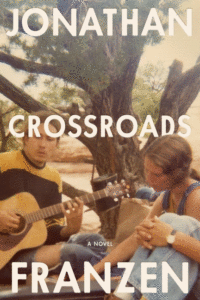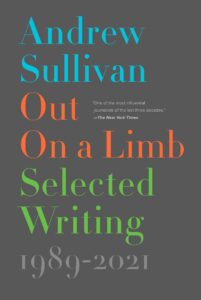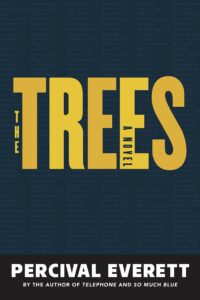
Our treasure chest of terrific reviews this week includes Brandon Taylor on Sally Rooney’s Beautiful World, Where Are You, Frank Guan on Jonathan Franzen’s Crossroads, Lorraine Berry on Lauren Groff’s Matrix, Dale Peck on Andrew Sullivan’s Out on a Limb, and Christian Lorentzen on Percival Everett’s The Trees.
“…has the arid, intense melancholy of a Hopper painting … In these sections, particularly passages written in Eileen’s voice, Rooney sheds the stiff pelt of scene-building and attains a clarity reminiscent of Rachel Cusk’s in her Outline trilogy … is carefully formless and its characters are fluent in our lingua franca of systemic collapse, that neoliberal patter of learned helplessness in the face of larger capital and labor systems … kind of a vibey omniscience that proceeds by way of spare descriptions. Rooney writes scenes as though she had to type them out on a TI-89. Nouns and verbs. This can be lovely, as when she describes empty rooms or the touch of someone’s hand on a wrist. Her writing about sex is taut and direct. It’s a narrative style I associate with the films of Andrew Haigh and Joanna Hogg, two great visual poets of social anxiety and reticence … Rooney’s dialogue is frequently perfect, so perfect that it occasionally turns into a flaw. That is, Rooney’s characters speak as though they’re in a ’90s rom-com or else the adaptation of an Evelyn Waugh novel … at times it feels like a hammy line reading. Much like their compatriots—narrators from novels by Sheila Heti, Ben Lerner and Andrew Martin—Rooney’s characters chatter about the pointlessness of feeling that the world is too far gone to do anything about even as they seem to agree that our problems tower high above our heads … In my less charitable moments, it felt as though we’ve reached a point in our culture where the pinnacle of moral rigor in the novel form is an overwhelmed white woman in a major urban center sighing and having a thought about the warming planet or the existence of refugees … I found the novel’s defensiveness about the moral dubiousness of its aesthetic project kind of charming, but also frustrating. Yet, for all that, Beautiful World, Where Are You is Rooney’s best novel yet. Funny and smart, full of sex and love and people doing their best to connect.”
–Brandon Taylor on Sally Rooney’s Beautiful World, Where Are You (The New York Times Book Review)

“Giving up, for now, in Crossroads, on representing present youth, Franzen has doubled down on representing the white ones’ parents and grandparents as the impressionable, inquisitive, and dynamically flawed young men and women that they once had been. In dreams, as a once-famed tale from the Depression had it, begin responsibilities … To set a novel half a century in the past, as he now does, is something like dealing oneself a full house. In playing to his strengths so inordinately he has unlocked a new, late style, distinct from the well-hewn blocks of prose poetry typical of his first three novels or the mashed-potatoes-and-gravy consistency of his last two. The Corrections was a masterpiece, but Crossroads is his finest novel yet. Unpolished and unsloppy, difficult to quote or fault, his free indirect style sticks to the contours of consciousness and attempts not one thing else. In a quiet and uncanny fashion it is entirely adequate: a prosaic causeway coursing through the swamp at night … Though no serious fiction writer would impose their own belief upon their readers, what Crossroads does make clear is that Franzen, through his characters, has rendered it impossible for readers not to be engaged by the most momentous questions of faith … His ambition in this novel is not only to mirror society, but to return the individual reader to themselves, to grind a lens in which the major questions structuring our single lives on Earth retain their focus and integrity. All of this sounds Dostoyevskian because (with the requisite adaptation for American environs) it is … Crossroads is Franzen’s greatest and most perfect novel to date, but more importantly, it is his most promising: an inexhaustible resource for future novels, and not only his own. What impresses most is the sense that its successors, hopefully present soon, will all but certainly exceed it.”
–Frank Guan on Jonathan Franzen’s Crossroads (Bookforum)
“History has left behind huge gaps where once there were lives of meaning and purpose. For the historian, restoring them requires painstaking research. But for the novelist these erased canvases offer the opportunity to paint a world full of color and light … Skirting the pitfalls of revisionist history, it is fiction neither as plodding realism nor as implausible feminist anachronism, but rather something in between and beyond: a rigorous, living vision of what could have been … Groff beautifully captures Marie’s teenaged sulk … Marie is not caught up in the exhaustive details of ordinary life in the 12th century, sparing the reader the encyclopedic data that can bog down historical novels … As issues of bodily autonomy are once again thrust into the spotlight by developments in Texas abetted by the U.S. Supreme Court, reading Matrix is a balm. The insistence that a woman’s worth is tied to her physical self, rather than her intellect and spirit, is a dark cloud that has broken open numerous times in the West. If only it could be banished by an abbess, or a novel.”
–Lorraine Berry on Lauren Groff’s Matrix (The Los Angeles Times)

“Making your way through the barrage of lies, half-truths, innuendoes, and provocations that characterize this 576-page miscellany of Sullivan’s career has all the appeal of plunging an overfull toilet: you just know shitty water’s going to soak the bathmat. … Sullivan, however, has spent the better part of forty years clinging to fantasies of a rational, compassionate conservatism ‘dedicated to criticizing liberalism’s failures, engaging with it empirically, and offering practical alternatives to the same problems’—as though this is a thing that has ever existed anywhere in the history of the world … At the beginning of this book you get the sense that Sullivan’s gaslighting his readers, but the deeper you go you start to wonder if he’s actually gaslighting himself … That’s right, folks: as many as a million people were killed in a pointless war that Andrew Sullivan hawked like a fishwife for no other reason than his need to punish as many Muslims as possible for 9/11, but what’s important to remember is that he feels really bad about it … he doesn’t realize his alienation stems from wanting to belong to clubs whose members hate him not for what he says or what he does but for what he is.”
–Dale Peck on Andrew Sullivan’s Out on a Limb (The Baffler)

“The Trees is a wild book: a gory pulp revenge fantasy and a detective narrative that alternates between deadpan and slapstick modes of satire. It has all the right beats for the big screen, except that it’s too profane and obscene to be greenlit in Hollywood, even for the likes of Quentin Tarantino. His retribution epics offer an obvious point of comparison: The Trees is just as blood-soaked and just as hilarious as Inglourious Basterds or Django Unchained, but it comes with more authentic historical weight for being set in a dreamlike counterpresent rather than a cartoonishly counterfactual past. As a response to the Trump presidency—Trump is a character who speaks in its pages—Everett’s message is, put bluntly: Fuck you, you stupid, cowardly, racist clown. That goes for his supporters, too. Empathy is not the game here … The Trees, though it features spontaneous uprisings across the country, isn’t an answer to last year’s mass protests, but the book and the movement spring from the same bitter sources … It’s tempting to call The Trees the ultimate novel of the Trump era. It is the rare book that sees the forty-fifth president less as a menace here than a nuisance, the Republicans as so many falling elderly dominoes, and their white-supremacist voters a decrepit network of armed bozos. In that way, it’s also tempting to read The Trees as a hopeful book, but such a reading might also be naive. At the end, Damon is still typing out names, because the names of the dead keep coming, and history never stops.”
–Christian Lorentzen on Percival Everett’s The Trees (Bookforum)
If you buy books linked on our site, Lit Hub may earn a commission from Bookshop.org, whose fees support independent bookstores.

